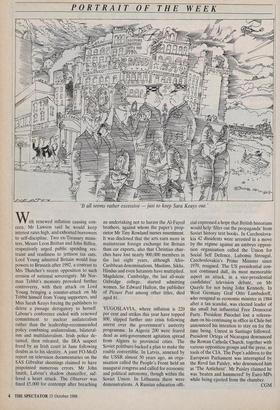PORTRAIT OF THE WEEK
`It all seems rather excessive — just to keep Sara Keays out.'
With renewed inflation causing con- cern, Mr Lawson said he would keep interest rates high, and exhorted borrowers to self-discipline. Two ex-Treasury minis- ters, Messrs Leon Brittan and John Biffen, respectively urged public spending res- traint and readiness to jettison tax cuts. Lord Young admitted Britain would lose powers to Brussels after 1992, a contrast to Mrs Thatcher's recent opposition to such erosion of national sovereignty. Mr Nor- man Tebbit's memoirs provoked further controversy, with their attack on Lord Young bringing a counter-attack on Mr Tebbit himself from Young supporters, and Miss Sarah Keays forcing the publishers to delete a passage derogatory to herself. Labour's conference ended with renewed commitment to nuclear unilateralism rather than the leadership-recommended policy combining unilateralism, bilateral- ism and multilateralism. Irish police de- tained, then released, the IRA suspect freed by an Irish court in June following doubts as to his identity. A joint FO-MoD report on television documentaries on the SAS Gibraltar shootings claimed to have pinpointed numerous errors. Mr John Sinith, Labour's shadow chancellor, suf- fered a heart attack. The Observer was fined £5,000 for contempt after breaching an undertaking not to harass the Al-Fayed brothers, against whom the paper's prop- rietor Mr Tiny Rowland nurses resentment. It was disclosed that the arts earn more in mainstream foreign exchange for Britain than car exports, also that Christian chur- ches have lost nearly 900,000 members in the last eight years, although Afro- Caribbean denominations, Muslims, Sikhs, Hindus and even Satanists have multiplied. Magdalene, Cambridge, the last all-male Oxbridge college, started admitting women. Sir Edward Hulton, the publisher of Picture Post among other titles, died aged 81.
YUGOSLAVIA, where inflation is 220 per cent and strikes this year have topped 800, slipped further into crisis following unrest over the government's austerity programme. In Algeria 200 were feared dead as anti-government agitation spread from Algiers to provincial cities. The Soviet politburo backed a plan to make the rouble convertible. In Latvia, annexed by the USSR almost 50 years ago, an orga- nisation called the People's Front held an inaugural congress and called for economic and political autonomy, though within the Soviet Union. In Lithuania there were demonstrations. A Russian education offi- cial expressed a hope that British historians would help 'filter out the propaganda' from Soviet history text books. In Czechoslova- kia 42 dissidents were arrested in a move by the regime against an embryo opposi- tion organisation called the Union for Social Self Defence. Lubomic Strougal, Czechoslovakia's Prime Minister since 1970, resigned. The US presidential con- test continued dull, its most memorable aspect an attack, in a vice-presidential candidates' television debate, on Mr Quayle for not being John Kennedy. In West Germany Graf Otto Lambsdorff, who resigned as economic minister in 1984 after a tax scandal, was elected leader of the small but influential Free Democrat Party. President Pinochet lost a referen- dum on his continuing in office in Chile but announced his intention to stay on for the time being. Unrest in Santiago followed. President Ortega of Nicaragua denounced the Roman Catholic Church, together with various opposition groups and the press, as tools of the CIA. The Pope's address to the European Parliament was interrupted by the Revd Ian Paisley, who denounced him as 'The Antichrist'. Mr Paisley claimed he was 'beaten and hammered' by Euro-MPs while being ejected from the chamber.
CGM


























































 Previous page
Previous page